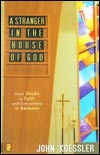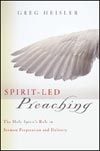Skill Builders
Article
2007 Preaching Book Awards
Effective preachers are always growing, and those who grow read.
Each year, PreachingToday.com selects two new preaching books for book-of-the-year awards: one that focuses primarily on the skills of preaching and the other on the soul of the preacher. Both are essential.
The winners this year were chosen by votes from two preaching experts and Brian Larson, editor of PreachingToday.com. In this article we honor the book published in 2007 that wins the award for speaking to the preacher's soul.
2007 Book of the Year for the Preacher's Soul
Spirit-led Preaching
The Holy Spirit's role in sermon preparation and delivery
By Greg Heisler
B & H Publishing Group, 2007
 |
Greg Heisler is a bold writer. First, he tackles a controversial subject: how preachers experience the work of the Holy Spirit in the preparation and delivery of their messages. Second, he faces difficult issues head on. He has worked through the questions and is not afraid to clearly state where he stands.
For example, in a chapter devoted to "the anointing" or "unction" of preaching, Heisler writes, "To reduce powerful preaching to talent—even God-given talent—seems to me to overlook the Spirit's ministries made available to us in preaching" (130). Heisler clearly believes the empowerment of the Spirit is not something the preacher can take for granted. This practical focus is one of the things we appreciate most about his book: the author talks both theology and experience. He is keenly tuned to what the Scriptures say about the work of the Spirit and how we actually go about preaching in his power.
Several core convictions drive the book. Heisler believes preaching must rely on the power of both Word and Spirit (10–11). He writes, "We have lost our sense of the supernatural, and as a result, preaching has become the activity of man instead of the ministry of God" (11). But he does not downplay the importance of exegesis or homiletics. He says preachers must pay attention both to the dynamics of preaching and the mechanics of preaching (12). He champions sequential exposition of Scripture but distinguishes between a sermon that is driven by the text and a sermon that is driven by the Spirit down the path of the text (18–19).
Greg, who pastored for eight years and now teaches preaching at Southeastern Seminary in Wake Forest, North Carolina, writes, "One characteristic of Spirit-empowered preaching is 'fearlessness' or 'boldness'" (136). With that description in mind, we would say Greg is a Spirit-empowered writer. Any preacher who longs to see lives changed and to preach with a sense of God's presence will want to read Spirit-led Preaching.
Book Contents
Introduction: What Spirit-Empowered Preaching Looks Like
- Missing in Action: Where Is the Holy Spirit When We Preach?
- What Is Spirit-led Preaching?
- The Biblical Foundation for Spirit-led Preaching: Paul, the Prophets, and Jesus
- Recovering the Doctrine of Illumination for Spirit-led Preaching
- Word and Spirit Together: The Theological Foundation for Spirit-led Expository Preaching
- The Spirit and the Preacher's Sanctification
- The Spirit and the Sermon's Preparation
- The Spirit and the Sermon's Presentation
- The Holy Spirit and the Anointing: Understanding the Spirit's Empowerment for Preaching
Interview
PreachingToday.com had the opportunity to talk with Greg Heisler about his book and his preaching.
PreachingToday.com: In your book Spirit-led Preaching, you distinguish between the dynamics of preaching and the mechanics of preaching and how this distinction relates to our being led by the Holy Spirit. Talk about that.
Greg Heisler: When I was in seminary, the greatest emphasis in our preaching class was on the sermon mechanics and how we were supposed to craft an introduction, conclusion, body, transitions, and illustrations. In the process of trying to put all the nuts and bolts of the sermon together, we lost focus on the spiritual dynamics that have to be in place for powerful preaching to occur. What I have tried to emphasize is that we need to make sure we are walking in God's presence under the power of the Holy Spirit and living in obedience to him before we stand up to preach in God's name.
You compare a picture of the current text-driven model of expository preaching with a proposed model of Spirit-driven preaching. The picture of Spirit-driven preaching is of a locomotive that has one car behind it while it makes its way down the tracks toward a certain destination. Explain that diagram for us.
One of the emphases in expository preaching has rightly been on the Word of God. In the illustration, I was showing that some expository preachers and teachers of preaching have so emphasized that the text drive the sermon—that the purpose of preaching is to read the text, explain the text, and apply the text—that they oftentimes leave the dynamic of the Holy Spirit's role in preaching out of the conversation. I want preachers to understand that preaching involves the Word, but also the Spirit. What I try to do in a visual way is show that the Spirit needs to be driving this sermon. The Holy Spirit drives the sermon down the path of the biblical text, and the train is still on the tracks, moving toward a Christological witness and a Spirit-empowered obedience on the part of the listeners.
I don't want it to look like I'm coming out against the Word. I just think that it's a Spirit-illumined Word to the preacher. As we're preaching, the Spirit also quickens that Word to the hearts of the listeners. For us to say, "Well, we assume the Holy Spirit's involved all along," is probably not doing justice to the Spirit's role in preaching. We have to move beyond assuming that the Spirit shows up at 11:00 on Sunday morning and blesses the sermon. Instead, we need to go back and reevaluate ourselves, asking, "How are we approaching preaching in terms of being Spirit-led and Word-driven and giving a Christological witness?"
You mention the importance of the doctrine of illumination—that if we're going to have Spirit-led preaching, we need to understand how illumination works in the whole process of preparing and delivering a sermon.
One of the greatest temptations we face when it comes to preparing a message is to reach for a commentary. I know in my own preaching that's been a temptation—to say a quick prayer and then grab some resources and start digging into the text. We need to go back to Psalm 119:18 where the Psalmist says: Open my eyes that I may see the wonders of your Word.
That opening of the eyes is the same experience that the disciples had on the road to Emmaus. Before the word burned in their hearts, their eyes had to be opened. We need to return to the spiritual and devotional reading of God's Word to allow the Holy Spirit to let us soak in a text before we get up to preach it. We need to ask the Spirit to make the text hot in our hearts. That's what illumination is all about. The Spirit provides the heat of the text so that we sense it, feel it, and are convicted by it. We are drawn to repentance and confession and obedience through that experience. When that takes place in a preacher's heart—in the study before he ever gets into the pulpit—it makes for richer, more incarnational preaching.
You also talk about the controversial subject of "the anointing"—or what's also called unction—in preaching. What's your view on that?
In 1 Corinthians 2:4, Paul says: My preaching was not with wise and persuasive words but it was in demonstration of the Spirit's power. I think there's a biblical model for preaching in there for us. Paul's preaching was literally proved by the Spirit. The Spirit of God authenticated the message he was preaching, proving it was true and worthy of reception and obedience. That's how the Spirit empowers our preaching. He is the authenticator, proving our preaching and partnering with the Word of God as we proclaim it, making it effective, powerful, life-changing, and transformative.
Perhaps we should drop the loaded language of "the anointing" because there's so much controversy about that term. We don't know what it means exactly, because it's been thrown around and abused, meaning so many different things to so many different people. Ultimately, I think the anointing is the Spirit's empowerment for preaching. It speaks to how the Spirit of God empowers the preacher, empowers the message, and illumines the audience to receive the message. I see the Spirit's involvement in preaching much like Paul saw it with the Thessalonians. He said: Our gospel came to you not simply with words but also with power and the Holy Spirit and with deep conviction. It's the Spirit that is bringing that penetrating and piercing ability to preaching that we know in our own human weakness and inability we can't do.
Anyone who's been preaching for long has had the experience of standing up to preach and feeling like it was just a human act—and that's a bad feeling. Most of us have also experienced that sense that we really did have God somehow working with us as we proclaimed the Word—and that is truly a wonderful thing to experience.
It's important when you raise that issue to understand that this approach to Spirit-led preaching is not a formula. If you come to the last chapter in my book looking for four quick ways to get the Spirit involved in your preaching, you're not going to find them. This comes out of a relationship. It comes out of trust, faith, prayer, and walking with God.
Honorable Mention
 |
A Stranger in the House of God
From doubt to faith and everywhere in between
By John Koessler
Zondervan Publishing
In the ever-expanding sphere of spiritual memoirs, John Koessler's A Stranger in the House of God deserves a special look. Koessler paints a portrait of his faith journey in courageously transparent strokes, inviting us to feel the pain of being an outsider looking in, the whiplash of failed prayer, the ups and downs of pastoral ministry, or the uncertainty of deciphering theology that seems just beyond grasp. From start to finish, we feel a subtle push to reflect on our own faith journey or simply to gather enough courage to take another trembling step.










